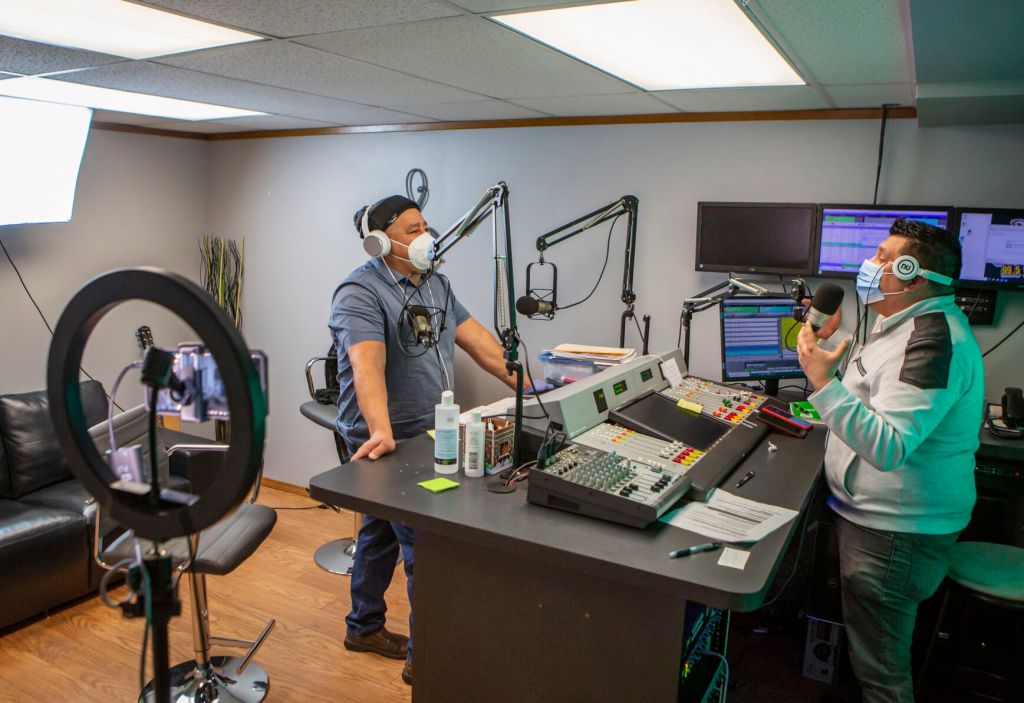Umatilla County sponsors Spanish-speaking radio show to share experiences with COVID-19
Published 4:00 am Thursday, January 28, 2021

- Jose Garcia, left, and Rafael Romero host Radio La Ley’s “La Voz Del Pueblo” on Sunday, Jan. 24, 2021, from a studio in Kennewick, Washington.
HERMISTON — Early in the pandemic, Jose Garcia said most of the stories told about COVID-19 on Radio La Ley’s “La Voz Del Pueblo” (The Voice of the People) were of fear and misconception.
Slowly, more residents tuned in each Sunday, sharing stories of COVID-19 on a weekly hourlong section of the radio show called “Acción Rural Hispana,” which Garcia hosts. It became clear to Garcia how the show would be a valuable resource bringing answers to the Spanish and Mam dialect-speaking community — how to stay safe, what common symptoms of COVID-19 are and where to get help.
“We were trying to figure out how this was going to affect the Latino community,” Garcia, chair of the Hispanic Advisory Committee in Hermiston, said. “But we didn’t know to what extent it would.”
The Umatilla County Public Health Department allocated new funding to sponsor the radio show, which broadcasts out of Kennewick, Washington, and was launched in April 2020 by Oregon Rural Action, a grassroots organization that aims to promote social justice, diversity and the environment in rural Oregon communities.
“We’re told it’s become very popular,” said Joe Fiumara, the county’s public health director. “We thought it was a good way to keep an opening to the (Hispanic) population, which is hard for us to reach.”
The funds will help pay for advertisements and the show itself, and will help it run for another year. Fiumara said county health officials will work with the show to provide written responses to listeners’ questions about the virus.
Garcia estimated the show has a regular following of around 15,000 people that spans across Umatilla, Morrow and Union counties, as well as the Tri-Cities in Washington.
Local Hispanic and Latino listeners have called in with many stories, Garcia said. Entire crews of farmworkers falling ill. Family and friends who refrained from telling employers they tested positive because, living paycheck to paycheck, they must work and support their family.
One story Garcia said he has heard from perhaps 10 families on the show. Their loved one tested positive for COVID-19 at a local hospital, but was later sent home — partly because the hospital was at, or nearing, capacity. With little help and care, their symptoms worsened, prompting their families to bring their sick loved one back to the hospital where, weeks later, they died.
“Most of our stories right now are from people who had somebody that they lost to COVID-19,” he said.
In Oregon, Hispanic people account for 13% of the state’s population but have reported 36% of its total cases, according to the Oregon Health Authority as of Thursday, Jan. 21.
Nationally, Hispanic and Latino people have suffered higher rates of infection in hundreds of counties and in urban, rural and suburban areas, according to the New York Times.
According to a report from the Centers for Disease Control and Prevention, Hispanic and Latino Americans are infected at a rate 1.7 times higher than those who are white, and hospitalized with COVID-19 at a rate 4.1 times higher.
Hispanic and Latino people who have contracted COVID-19 also died at a rate 2.8 times higher than white people, according to the CDC.
Researchers attribute these disparities to a variety of factors, including socioeconomic status, unequal access to health care and workplace exposures in frontline, essential and critical infrastructure jobs.
Many of those disparities are playing out in the lives of Hispanic and Latino residents in Eastern Oregon, Garcia said. But the radio show has helped, providing an outlet for people to talk about their experiences and seek guidance, he said.
Garcia said he hopes the newly allocated funds will eventually expand airtime and allow them to invite more experts to talk on the show about a variety of topics related to COVID-19, including mental health problems and economic hardship.
“I want more people to call in and tell us what their challenges are,” Garcia said.




